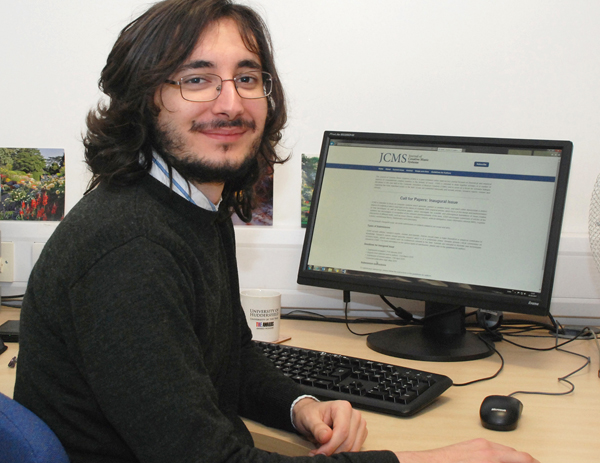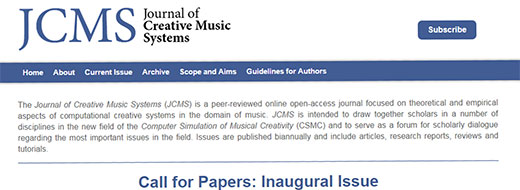Journal launched for computers that can create their own music
 The journal's associate editor PhD researcher Valerio Velardo.
The journal's associate editor PhD researcher Valerio Velardo.
Tue, 29 Sep 2015 16:23:00 BST
“...people at home could create their own music on demand...”
 RESEARCHERS at the University of Huddersfield are to publish a new journal that explores a future in which computers capable of independent creativity compose their own music for an “audience” of other computers; and in which humans – instead of buying recordings from expensively-marketed pop and rock stars – simply order their computer to come up with a new piece tailored to their taste and mood.
RESEARCHERS at the University of Huddersfield are to publish a new journal that explores a future in which computers capable of independent creativity compose their own music for an “audience” of other computers; and in which humans – instead of buying recordings from expensively-marketed pop and rock stars – simply order their computer to come up with a new piece tailored to their taste and mood.
The new Journal of Creative Music Systems is co-edited by Senior Lecturer in Musicology Dr Steven Jan (pictured right) and the associate editor is PhD researcher Valerio Velardo. Contributions are being invited from around the world and the inaugural issue will appear online in May.
“The field of computational creativity is vibrant at the moment,” said Dr Jan. “There is work being done to develop programs that can paint and that can write poetry and stories and generate humour.
“But computational creativity in music hasn’t been particularly well explored so far,” he added, explaining why it had been decided to launch the new journal.
There is a crucial distinction between “computer music”, in which humans use electronic technology as a compositional tool, and music that is actually created by computers. Dr Jan believes that recent developments mean that computers are increasingly capable of creativity.
“Things that were thought impossible ten years ago are now becoming a reality,” he said, although he added that programs which have been developed so far mainly focus on quite low-level compositional tasks, with only a few systems yet capable of generating a complete, fully-rounded composition from scratch.
Economic implications for the music industry
 Valerio Velardo – who has a background in both music and physics – has coined the term “anthropocentric” to describe music created by computers that can appeal to human listeners. In fact, some of this music is capable of passing the so-called “Turing Test” – meaning that it can be indistinguishable from music composed by a human musician.
Valerio Velardo – who has a background in both music and physics – has coined the term “anthropocentric” to describe music created by computers that can appeal to human listeners. In fact, some of this music is capable of passing the so-called “Turing Test” – meaning that it can be indistinguishable from music composed by a human musician.
The Italian-born PhD researcher – whose work is supervised by Dr Jan and Dr Jonathan Wakefield – says that computers capable of creating music could have a liberating impact similar to that of the digital camera. Just as everybody can now become a competent photographer, future software could enable people to input musical ideas that would then be processed and developed by the computer.
“And you don’t have to spend a lot of money on iTunes downloading your favourite tracks!” said Dr Jan. “You tell the computer that you want a piece of music to suit your mood or something like a piece that you heard last week and that you want it to be about three minutes long.”
This notion of “creativity as a service”, meaning people at home could create their own music on demand, could have considerable economic implications for the music industry, continued Dr Jan.
“Human beings will always gain pleasure playing music and listening to it performed by humans. But the need to have a Kanye West or a Rihanna, and the huge economic infrastructure that supports and markets such people, might be threatened and challenged.”
In addition to “anthropocentric” music created by computers, there is also the possible that they could develop of a musical language that humans are incapable of understanding or enjoying, but which could be appreciated by other machines.
Creative music systems could also lead to a deeper understanding of how human culture has evolved. For example, said Dr Jan, a computer could be “seeded” with patterns from music from the medieval period, and “counterfactual” histories of music could be simulated.
“Where would it go? Would it create a Monteverdi, a Bach, a Beethoven or a Stravinsky? Can we retrace the development of western music?” said Dr Jan.
- These are among the many dimensions of musical computer creativity that led to the decision to start the new journal. The deadline for submissions to the first issue is 31 January, 2016. Full details, including guidelines for authors, are available at http://www.jcms.org.uk/. Dr Jan’s fellow co-editor is Professor Eduardo Miranda, of Plymouth University, who was one of the first researchers in this field.







